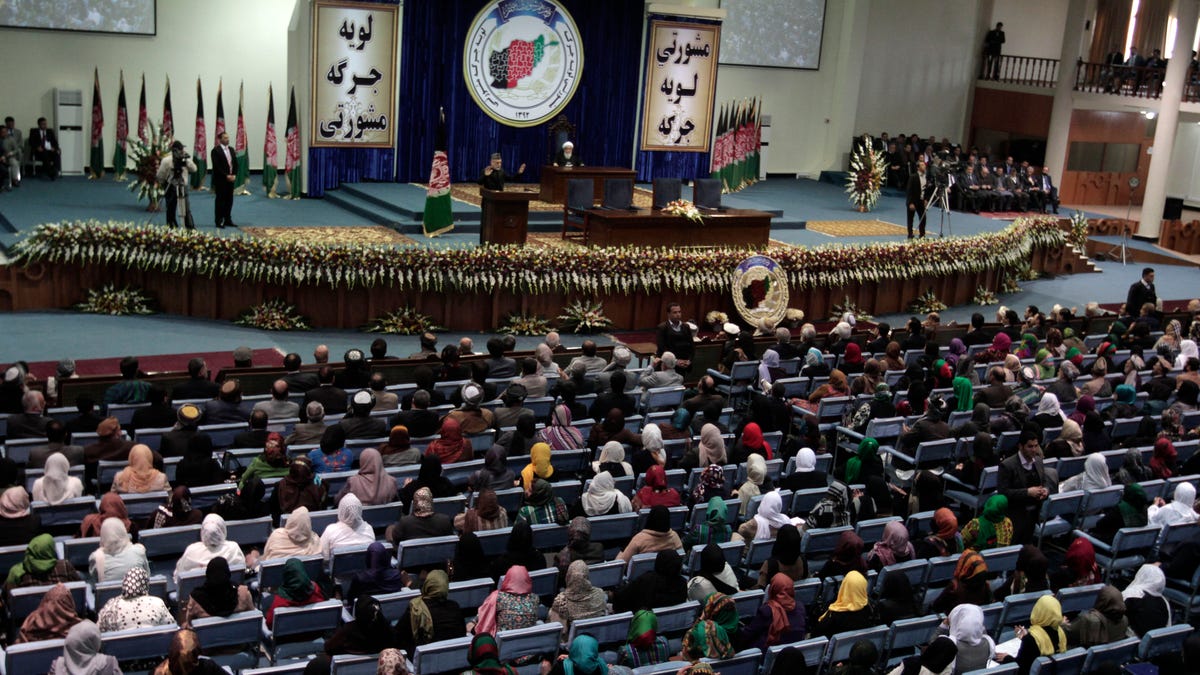
Afghan President Hamid Karzai speaks during the first day of the Loya Jirga in Kabul, Afghanistan, Thursday, Nov. 21, 2013. Karzai has told a gathering of elders that he supports signing a security deal with the United States if safety and security conditions are met. Karzai spoke as the 2,500-member national consultative council of Afghan elders known as the Loya Jirga started in Kabul on Thursday. The four-day meeting will discuss the bilateral security pact that defines the role of thousands of U.S. troops who will remain after the NATO combat mission ends in 2014. (AP Photo/Rahmat Gul) (The Associated Press)
Afghan elders from across the war-torn nation opened a meeting Thursday in Kabul to consider terms of a proposed security pact with the United States that would govern U.S. military presence in the country after the NATO-led combat mission ends next year. The elders attending the so-called Loya Jirga are to hold a series of closed-door meetings until Sunday and then offer their recommendations. Its decisions are influential but not binding, and the deal must still be approved by the Afghan parliament, which could ask for more changes. The U.S. and Afghan governments have agreed on the language of the proposed agreement, but changes can be made before any agreement is signed.
Here are some of the key provisions in the document as it stands now:
U.S. TROOPS
The agreement would give the U.S. a legal basis for keeping thousands of troops in Afghanistan after December 2014 when the international combat mission ends and also allows American forces to use bases across the country. The pact is set to remain in force until the end of 2024 and beyond, unless terminated by mutual agreement or by either party with two years' written notice. U.S. officials have not yet disclosed the number of U.S. troops they want to keep in Afghanistan after 2014, but U.S. officials have said that the U.S. and NATO could keep between 8,000 and 12,000 troops there. Of those, the U.S. is expected to provide no more than 8,000 to train, equip and assist Afghan security forces.
LEGAL JURISDICTION
The proposed agreement gives the U.S. legal jurisdiction over troops and Defense Department civilians who may get in trouble, while contractors would be subject to the Afghan judicial process if they were accused of breaking Afghan law. Deep divisions in Afghanistan over legal immunity for American soldiers had threatened to scuttle negotiations on the agreement. Such was the case in Iraq, when the U.S. and Iraq couldn't agree on terms of a security arrangement and all American forces were pulled out of the country.
COUNTERTERRORISM
The pact provides for continued U.S. counterterrorism operations in coordination with the Afghans, with the goal that the Afghan forces should be in the lead. It also notes that U.S. troops will not conduct any kind of combat operations unless they are "mutually agreed" upon by the U.S. and Afghans.
NIGHT RAIDS
Night raids have been a contentious issue between the Afghans and U.S. forces. Afghans have been culturally offended by foreign troops who have entered their homes because they see it as a violation of the sanctity of women. U.S. forces have claimed that night raids are a useful tool in tracking down, capturing and killing insurgent leaders. The proposed agreement states that U.S. forces should not "target Afghan civilians, including in their homes, consistent with Afghan law and the United States forces' rules of engagement." It also says that U.S. counterterrorism operations should be conducted with "full regard for the safety and security of the Afghan people, including in their homes" and that "U.S. forces can only enter Afghan homes in extraordinary circumstances when the life or limb of Americans is at stake."
AFGHAN SECURITY FORCES
The agreement states that the United States is obligated to seek funds from Congress every year to support the training, equipping and advising of Afghan security forces so that the country can independently secure and defend itself against internal and external threats.

